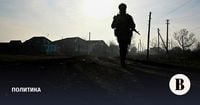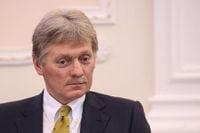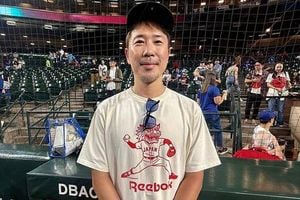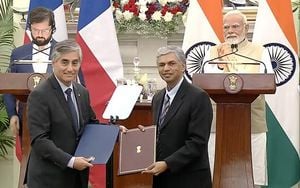As the world watches, the ongoing conflict between Ukraine and Russia has taken a new turn with the announcement of a three-day truce coinciding with the celebration of the 80th anniversary of Victory in World War II. Russian President Vladimir Putin proposed this ceasefire, which is set to take effect from midnight on May 8, 2025, until May 11, 2025. The Kremlin has reiterated its commitment to this truce, despite ongoing tensions and skepticism from Ukraine and its allies.
According to Alexey Arestovich, a former advisor to the head of the Office of the President of Ukraine, "Kiev will support the three-day truce in honor of May 9, 2025, which was proposed by Russian President Vladimir Putin, and which will take effect tonight, on May 7, 2025." However, Arestovich expressed doubts about the sincerity of both sides in adhering to the ceasefire, indicating that there is a lack of genuine desire to refrain from attacks across the border.
The Kremlin's position on the truce remains firm. Dmitry Peskov, the spokesperson for President Putin, stated, "This initiative is from the Russian side, from President Putin. It remains in force." He reaffirmed that the proposal for a ceasefire during the Victory Day celebrations is still valid, despite a recent attack by Ukrainian forces on May 7, 2025. Peskov emphasized that the Russian side is prepared to respond appropriately if provoked.
Maria Zakharova, a representative of the Russian Foreign Ministry, also confirmed that the truce will commence as scheduled, despite Ukraine's previous reluctance to halt hostilities even during the Easter period. She stated, "The cessation of fire will be in effect, despite the fact that Ukrainian troops did not agree to cease fire even on Easter." This has led to a complicated backdrop of mutual accusations regarding the violation of ceasefires.
As the truce approaches, skepticism abounds regarding its effectiveness. Both Ukraine and its Western allies are cautious, viewing the ceasefire as a potential tactic employed by Russia rather than a genuine step towards peace. Ukraine has called on foreign nations to refrain from participating in the Moscow parade scheduled for May 9, stating that involvement would be seen as disrespectful to the memory of those who fought against Nazism. The Ukrainian Foreign Ministry asserted, "Participation of foreign military personnel in this act is unacceptable and will be viewed by Ukraine as an affront to the memory of victory over Nazism."
Political analysts have voiced concerns about the implications of this truce. Olesya Yakhno, a political scientist, noted that the significance of May 9 in Russia has transformed into a state-building holiday, overshadowing even religious observances. She remarked, "For Russia, May 9 has indeed become a state-forming holiday. In some sense, it is even more important than religious ones because the war has become a kind of religion for Russia." The juxtaposition of celebratory events with ongoing military actions presents a stark contradiction that resonates deeply within the Russian narrative.
Yakhno further elaborated on the motivations behind the truce, suggesting it serves dual purposes: to simulate a dialogue with the United States and to delay potential escalations in American policy toward Russia. She argued, "Russia aims to create an illusion of a negotiating process that could lead to a cessation of hostilities," indicating that the Kremlin is keen to avoid further sanctions or diplomatic isolation.
Ukrainian President Volodymyr Zelensky has dismissed the proposed short-term truce as a "big theatrical production," emphasizing the need for a comprehensive and unconditional 30-day ceasefire to facilitate genuine diplomatic efforts. Zelensky stated, "It is impossible to talk about anything for three, five, seven days," highlighting the inadequacy of a brief truce in the context of ongoing hostilities.
Despite the looming truce, preparations for various scenarios are underway in Ukraine. Officials are bracing for the possibility of continued attacks, whether they be sporadic or concentrated, as history has shown that short-term ceasefires often fail to halt the violence entirely. The Ukrainian military is on alert, anticipating that hostilities may resume shortly after the truce period.
In the meantime, the situation has led to disruptions in Russian aviation, with drone attacks from Ukraine impacting the stability of operations at airports across Central Russia. The Association of Tour Operators of Russia reported that these attacks have affected at least 350 flights, stranding around 60,000 passengers.
The upcoming military parade in Moscow, which will feature leaders from 29 countries including Chinese President Xi Jinping and Belarusian leader Alexander Lukashenko, underscores the symbolic weight of the May 9 celebrations. Yakhno pointed out that the Kremlin's push for a truce during this period is not merely about humanitarian concerns but also about reinforcing the narrative of victory and strength in the face of adversity.
As the truce approaches, the world watches closely. Will it serve as a genuine step towards peace, or will it merely be a temporary pause in an ongoing conflict? The answers remain uncertain, as both sides prepare for the possibility of renewed hostilities as soon as the truce expires. The coming days will be crucial in determining the trajectory of this conflict and the broader implications for international relations.





